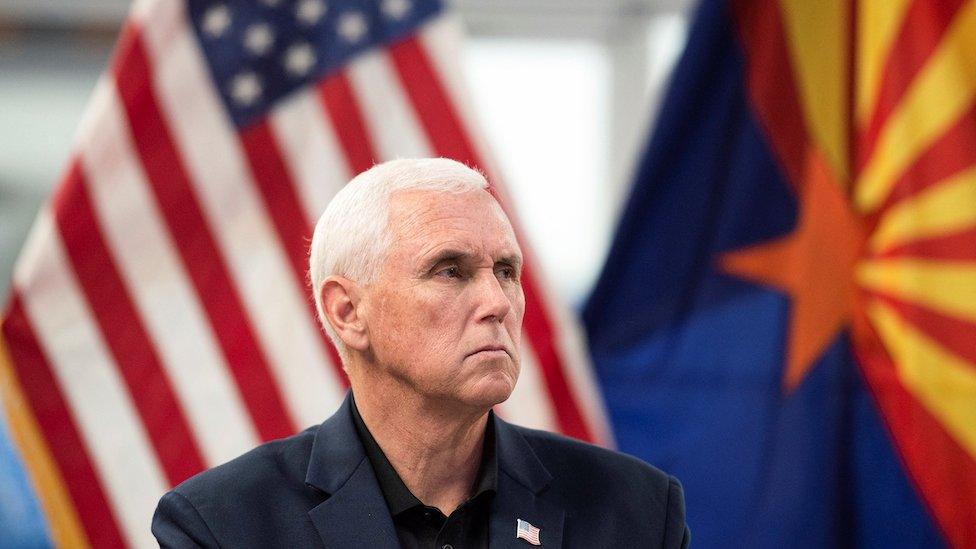Arizona primary: What one Republican's fate reveals about Trump's future
- Published
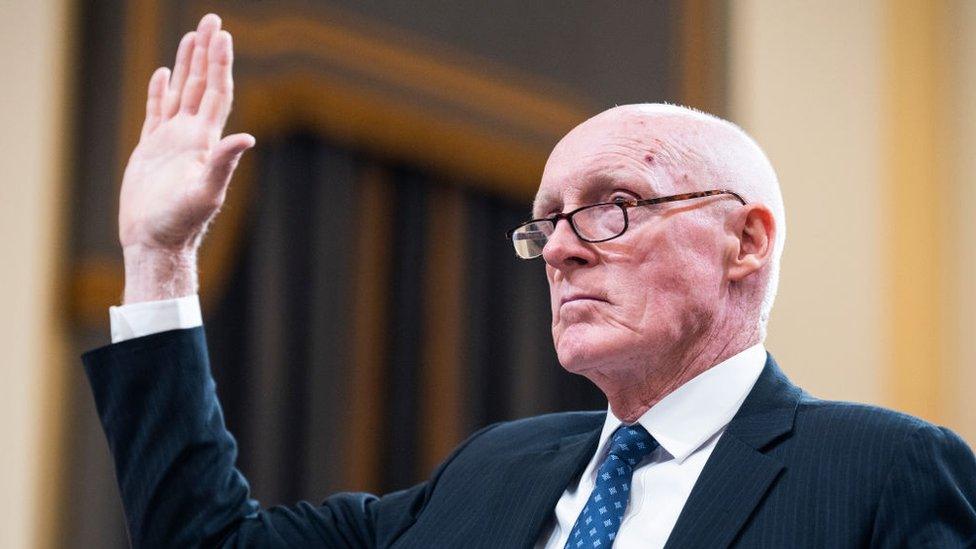
Rusty Bowers is running to become a Republican candidate in the Arizona State Senate election - but has faced the wrath of Donald Trump
On Tuesday, Republicans in Arizona chose between a Trump-endorsed candidate, and one who testified against the former president before the 6 January committee. The man who defied Donald Trump is now out of public office for the first time in 30 years - and his fate could be a harbinger of where the Republican Party is heading in the days ahead.
Rusty Bowers stood before a handful of supporters seated at park picnic tables shielded from the blazing Arizona sun.
The long-time politician - he's served in the state legislature since 1993 - was on the final stretch of a gruelling campaign, and he thanked the volunteers for agreeing to brave the heat and go knock on doors in a nearby Phoenix suburb.
Don Nicoll, who has known Mr Bowers for years, raised his hand. How should he respond if asked about a flurry of recent attacks against Mr Bowers - that he condones paedophilia, or election fraud, or teaching children to hate America? What should he tell voters who think Mr Bowers has been disloyal to Donald Trump or the Republican cause?
Mr Bowers shook his head and laughed. It's not the kind of question he's used to.
For most of his political career, the 69-year-old Arizona native - a former artist raised on a sheep ranch in Chino Valley - has been a safe bet for re-election. But that was before then-President Trump and his lawyer, Rudy Giuliani, pressured Mr Bowers, speaker of the state's House of Representatives, to discard the 2020 presidential election results that showed Democrat Joe Biden winning Arizona by roughly 11,000 votes.
It was before Mr Bowers travelled to Washington DC in June and testified to the congressional committee investigating the US Capitol riot. He spoke emotionally there about how he felt pressured during two 2020 phone calls to violate his duty as an elected official.
"You are asking me to do something that is counter to my oath, when I swore to the Constitution to uphold it," he told the committee of his conversation with the president and Mr Giuliani. "I'm not going to put my state through that without sufficient proof? And that's going to be good enough with me? … No, sir."
Then there were the death threats and protests outside his home that required him, for a time, to have a state-provided security detail.
Last Monday, the Arizona Republican Party formally censured Mr Bowers, saying that he was "unfit to serve" the party and no longer a Republican "in good standing". And at a rally last Friday in the northern Arizona town of Prescott Valley, not far from the ranch where Mr Bowers grew up, Mr Trump singled him out by name.
"Rusty Bowers is a 'Rino' coward who participated against the Republican party in the totally partisan unselect committee of political thugs and hacks the other day and disgraced himself, and he disgraced the state of Arizona," the former president said, using a derisive acronym for "Republican in name only".
In April, Mr Bowers was awarded a John F Kennedy Profile in Courage Award for resisting Mr Trump's election pressure. But three months later, he was fighting for his political life, facing off against a Trump-endorsed opponent, David Farnsworth, whose campaign signs say he is "a conservative we can trust".
The two went head-to-head in Tuesday's primary - and Mr Farnsworth won by a sizeable margin. He will be the Republican pick on the ballot during November's mid-term elections, which almost certainly guarantees him a seat in the state legislature representing a constituency that tilts Republican.
The challenges Mr Bowers faced were representative of a larger battle within the Republican party. Arizona was only the latest, most pitched, battleground in the internal struggle over what it means to be a Republican - and a conservative - after Mr Trump's presidency.
In the past months, as the party's voters have headed to the polls to choose who will compete against the Democrats in November's congressional and governor elections, candidates faithful to Mr Trump have faced off against those that want to chart a course more independent of the former president.
The differences generally are not over policy so much as loyalty - dedication to the former president and a willingness to claim, without substantive evidence, that he was really the winner of the 2020 presidential election.
So far, there have been mixed results. Some Trump-endorsed candidates, such as JD Vance in Ohio, Mehmet Oz in Pennsylvania, Herschel Walker in Georgia and Chris Cox in Maryland, have won, occasionally against sizeable odds. Others - Janice McGeachen of Idaho, David Perdue in Georgia and Charles Herbster of Nebraska, among them - have not.
In few states was the divide within the Republican party on as stark display as in Arizona. The party infrastructure is entirely controlled by Trump loyalists - last year, the state sanctioned a questionable, privately contracted "ballot audit" of the 2020 election. The current officeholders are divided between Trump die-hards like congressman Paul Gosar and Andy Biggs, who took part in White House meetings to plan ways to overturn the 2020 election results, and Governor Doug Ducey, who memorably sent a call from Donald Trump to voicemail as he was certifying Joe Biden's Arizona victory.
Today's Arizona electorate is divided roughly into thirds - one part Democrats, one part Republicans and one part independents who do not identify with a political party or participate in the primaries that choose its nominees.
Kevin DeMenna, a longtime Arizona political consultant and Republican strategist, said the Republican third, which has been shedding supporters to the independent bloc, is now comprised primarily of Mr Trump's supporters.
"We're at a breaking point where I think Trump, the weight of what he has brought to Arizona politics, is going to lead to a family feud," he said. "Right now, the Republican party is not a machine that elects or defeats candidates. It's a Trump propaganda arm."
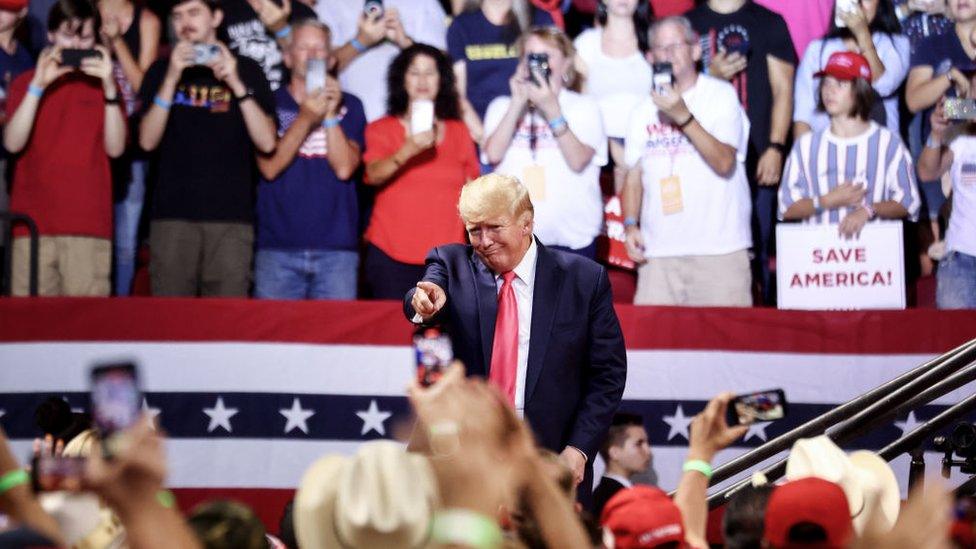
Donald Trump is endorsing loyalists for the midterm elections
On the same day that Mr Trump held his Prescott Valley rally, Mr Ducey was in Phoenix, with Mr Bowers and former Vice-President Mike Pence, who was holding an event to support Karrin Taylor Robson, a candidate for governor .
In a recent governor's debate, Ms Robson was the only Republican not to raise her hand when asked if the 2020 election was stolen from Mr Trump. And in his remarks, Mr Pence tried to draw a line between candidates like Ms Robson and those endorsed by his former boss - albeit while still trying to boast of the record of the "Trump-Pence administration".
"There are those who want to make this election about the past," he told the crowd. "You can send a deafening message that can be heard all across America that the Republican Party is the party of the future."
The past or the future? Trump or someone else? If Arizona Republican primary is any indication, the former president's influence is still strong. From the top to the bottom of the ballot - from Ms Lake down to Mr Farnsworth, Trump-endorsed candidates were either leading or had already been declared victors in Arizona's primary.
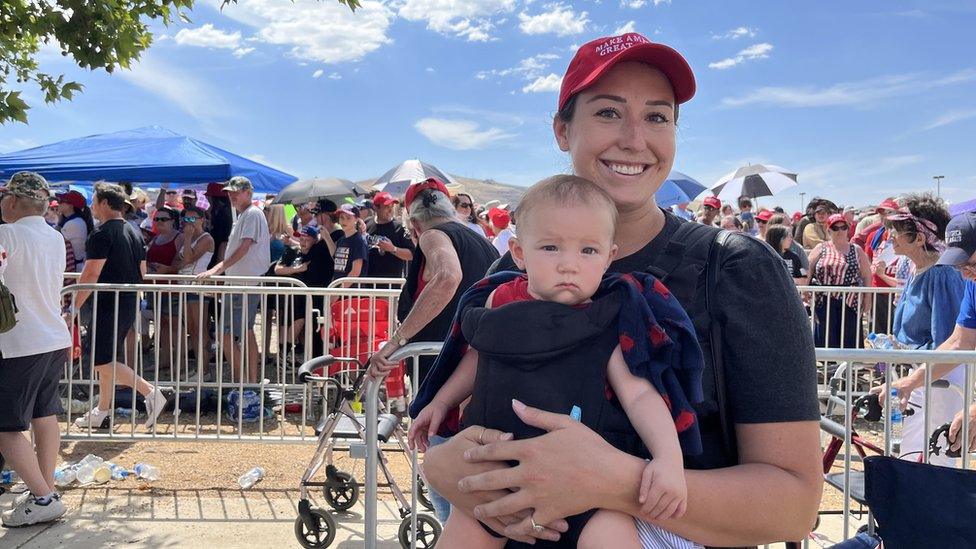
Taylor Byerly says she can wear her Maga hat freely now that she lives in Arizona
Trump rallies are political cocoons, where supporters gather with fellow fans to celebrate their man and his "Make America Great Again" movement. Outside a 6,000-seat sports arena in Prescott Valley last Friday, thousands of Trump loyalists lined up for hours in 100F (37C) heat to get good seats.
Among the faithful, it was clear Mr Trump's message - about the 6 January hearings and Republicans like Mr Bowers who have co-operated with it; about who is with the former president and who is against him - is getting through.
"Anyone that stands with that January 6 committee is a communist," Del Myers, a Prescott gun dealer, said when asked about Mr Bowers. "That's a strike against him right there. That was not an insurrection. Those were peaceful protests."
Taylor Byerly recently moved to Arizona from San Francisco, where she said she never felt comfortable wearing her Maga hat. In Arizona, she fits right in - and brought her seven-month-old daughter to the rally. She said she'll vote for whomever Mr Trump endorses.
"I could do research, but the internet lies," she adds. "So if Trump is saying they're a good person, that's all I need to hear."
According to Mr DeMenna, the Republican strategist, these kinds of views are common among those who vote in the party's primaries.
"Donald Trump's doing well," he said. "Every candidate that he has endorsed has experienced a measurable increase in voter support. The loyalty, the fealty of the Maga crowd is unparalleled."
Inside the arena, the message was similar.
"We have got an America First slate like you would never believe here in Arizona," Arizona Republican Party chairwoman Kelli Ward - who technically is not supposed to make endorsements in the primary - told the crowd, after listing off Trump-endorsed candidates she had already cast her postal ballot for.
"The swampy, consultant-loving, money-grubbing GOP establishment wants to install their choices. Do not allow it."
Rusty Bowers is a 'Rino' coward... and disgraced himself, and he disgraced the state of Arizona.
When told of Mr Trump's comments during the Arizona rally, Mr Bowers said he's puzzled that the president would go out of his way to attack him personally.
"I'm not the one hiding from the truth," he said. "I'm the one who has told the truth. It says more about him than it does about me. I'm nobody. He's the former president of the United States of America."
But when it comes to questioning his conservative credentials - as someone who has worked in Republican politics since the 1990s - that makes him angry.
"What is a conservative?" he asked. "Now it's been stolen, and the name doesn't mean what it used to. It meant to conserve long-term, institutionally proven things in a culture - family, economic power, education, freedom - things that you would want to conserve."
He said he feels alienated from his party, but that there are "hundreds of thousands" of Arizonans who feel the same way and have left the Republican party to be politically independent or unaffiliated.
"The usurpation of the party, I call it a coup, it's been growing for some time," he said. "There's this sanitising of the party, over and over."
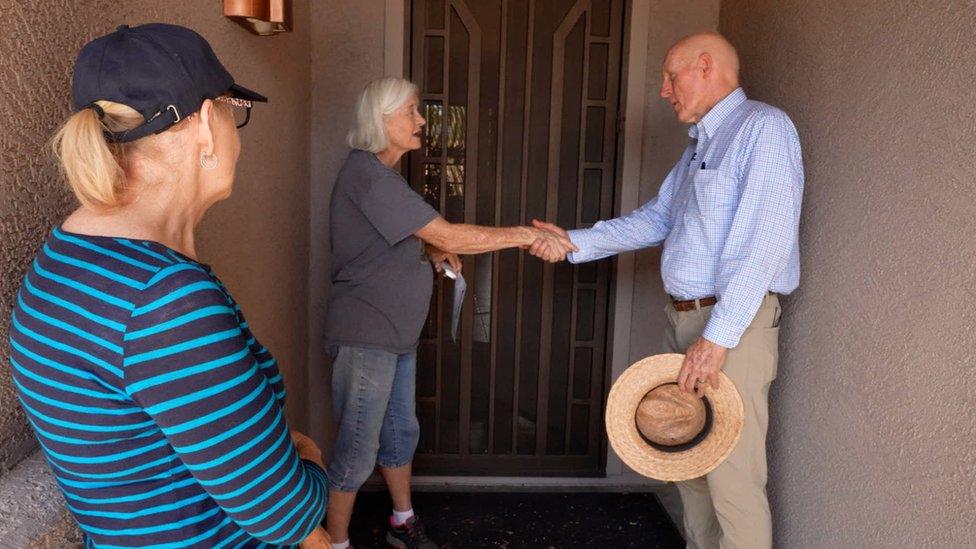
Pamela will be voting for Rusty Bowers - one of few voters in her Arizona neighbourhood to do so
After talking with his supporters back near Phoenix, Rusty Bowers set out to do some door-knocking of his own. Donning a wide-brimmed hat to cover his balding head, he went in search of voters - some identified by local voter data spit out by a mobile phone app that he seemed somewhat unsure how to use and others just through random stops.
He found a person who, coincidentally, was a high-school classmate of his wife - one of the benefits of having roots in an area built up over decades.
Then he met Pamela, in a nearby house, who was just about to fill out her mail-in primary ballot. She said she was voting for Mr Bowers and that he had done the right thing.
"When the morons over there decided their censure, I just shook my head and I said this guy has got to push back," she said. "We don't need those radicals. It's turning everything into so much confrontation."
After the chat, Mr Bowers and his campaign manager stuck a yard sign in Pamela's gravel-and-cactus covered front yard. One voter down, thousands more to go.
The reality, however, was that Mr Bowers had an uphill battle to stay in office. When he asked Pamela if there was anyone else in the neighbourhood she thought he might visit, she struggled to come up with an answer. Most, she said, were hardcore Republicans. One couple, she added, always flew Trump flags in their yard.
"I don't want to fight with them," Mr Bowers said.
On Tuesday, Mr Bowers learned his fate. Before his defeat, he said he would be at peace with such an outcome. When it's all done, he continued, he'll leave a legacy of courage, not cowardice, for his 20 grandchildren.
But he also had a parting word of warning for Republicans - and Americans - in Arizona and across the nation.
"The bully party of the Trump express, get ready for it," he said. "Because there's a lot of vengeance in it."
- Published15 June 2022
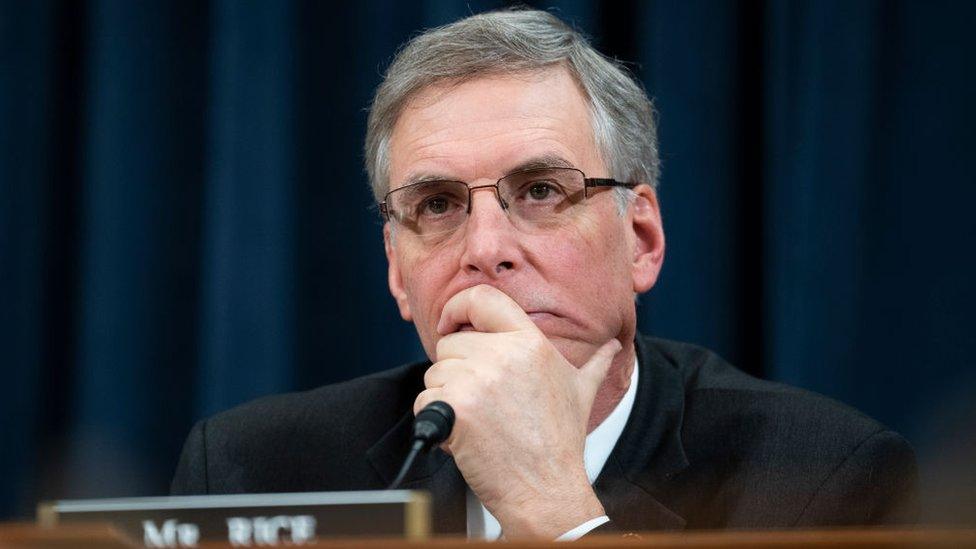
- Published14 June 2022
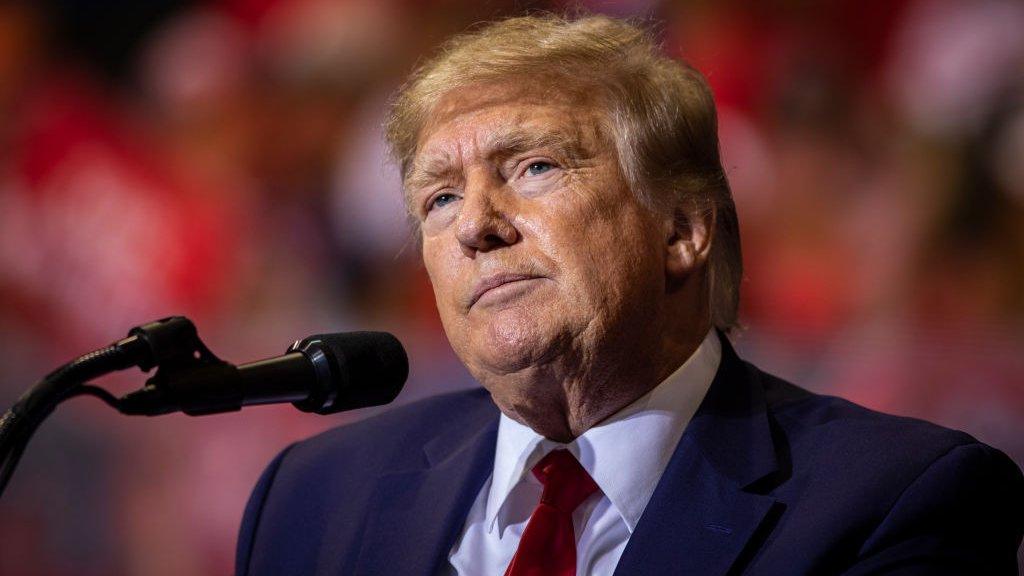
- Published18 May 2022
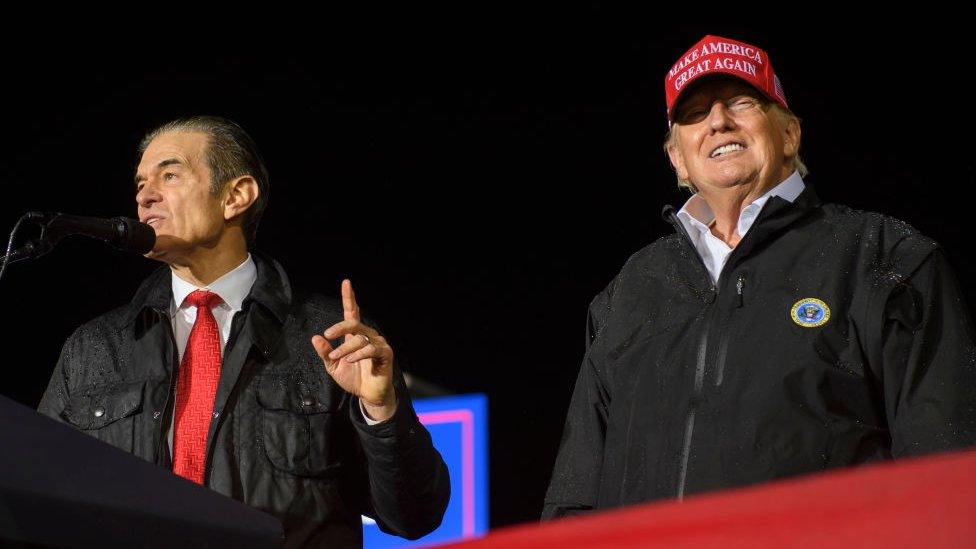
- Published26 June 2022
